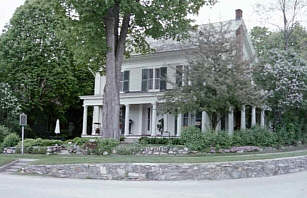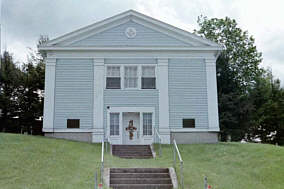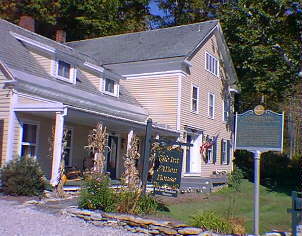ARLINGTONVERMONT |
 |
ARLINGTONVERMONT |
 |
 |
Chittendon Home Oldest frame building, one block east built by Jehiel Hawley, 1764, was home of Thomas Chittendon, Vermont's first governor. Legend says that the western vista with its great pine became the state seal in 1779. Ethan and Ira Allen lived nearby. |
At the northeast corner of Arlington’s main intersection is a home with a Governor Chittendon marker in front. A block east of the home is the Masonic Temple with historic markers on each side. Missing from the markers is the fact that sometime around May 6th, 1775, the patriot forces consisting of:
Edward Mott and about 16 volunteers from Connecticut
James Easton, John Brown and about 40 volunteers from the Berkshires
Ethan Allen, Seth Warner and about 200 Green Mountain Boys
passed through the area on their way to Ticonderoga.
 |
Near this spot stood the residence occupied during part of the conflict for the American Independence by Ethan Allen, resolute leader of the Green Mountain Boys whose courageous deeds in spoken and written words contributed powerfully to the establishment of the independent state of Vermont. He led the first successful, aggressive military expedition of the American Revolution when he captured Ticonderoga. |
|
Near this spot stood the residence occupied during part of the conflict for the American Independence by Thomas Chittendon, first governor of Vermont and one of the principle founders of the commonwealth. |
On the main street, just a few buildings up from the Chittendon Home marker, is an art gallery with paintings from another of Arlington's famous residents, Norman Rockwell.
Ira Allen House B&B.
 |
Sunderland Allen Families Lived Here Ira Allen lived on this site by the Battenkill and as treasurer and surveyor general, his office helped to shape the destiny of the republic of Vermont. Here, Ethan's family lived. Here, he dictated his free-thinking oracles of reason in 1782 to his bride, his second wife, he presented the first copy. |
"It is to be remembered that this was the first offensive part taken against Great Britain in the American Revolution" -- Ira Allen, 1798 (referring to the capture of Fort Ticonderoga).
